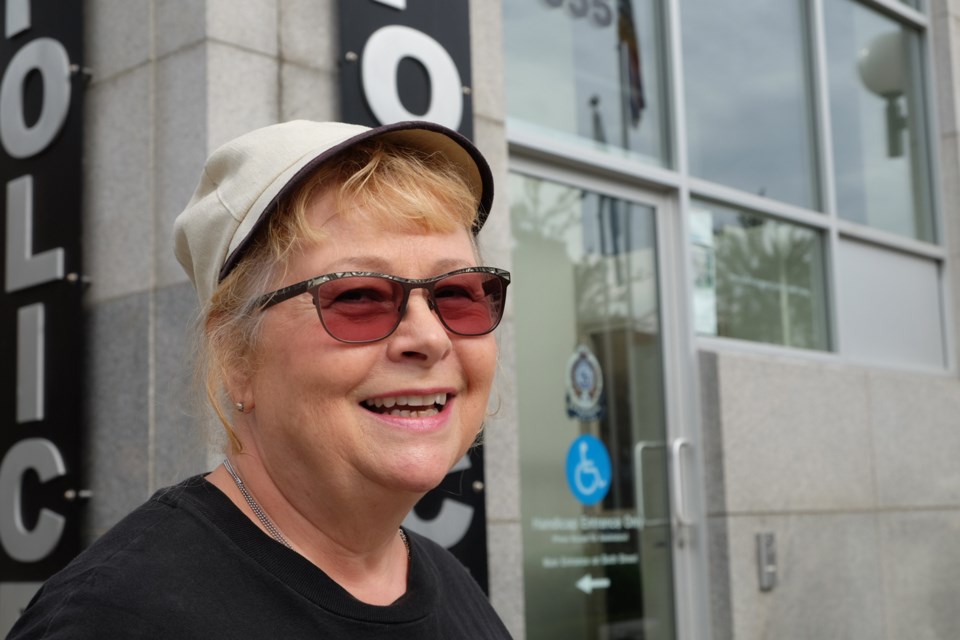For Carla Evans, the iconic Wait For Me Daddy photograph has always resonated in a personal way.
The Second World War photograph, taken by Province newspaper photographer Claude P. Dettloff in 1940, shows five-year-old Warren "Whitey" Bernard running after his father as a line of soldiers marches down Eighth Street in downtown New Westminster, heading off to war.
"That photo has always been with me, it's always spoken to me," says Evans.
The Dutch-born Evans moved to New Westminster as a child in 1951, when her parents decided to leave Holland after the war. Evans' aunt was a war bride who married a soldier from New Westminster, so the whole family decided to come to Canada to start a new and better life.
The war was always part of the backdrop of her family's story, so when the Royal City Literary Arts Society announced a call for poems inspired by the photograph, Evans was instantly sold.
She's pleased to have not one but two of her poems included in the Wait For Me Daddy Poetry Walk - which has 13 different poems displayed at nine locations around downtown New Westminster. A line of each poem is displayed prominently in the window of each participating business or office, with a copy of the entire poem in poster form next to it.
The Poetry Walk is one of a number of projects surrounding the upcoming Oct. 4 unveiling of Wait For Me Daddy - it was also the inspiration for the inaugural art exhibition at the Anvil Centre theatre (on now), and a War Stories literary evening is coming up Oct. 3 at the Anvil Centre.
The idea arose during a brainstorming meeting, when Royal City Literary Arts Society member Janet Kvammen threw out the idea of a poetry walk and putting poems in shop windows.
"Many ideas were presented at that city meeting, and I am thrilled this was one of those that came to fruition," she said in an email to The Record.
Poems from society members were chosen by a blind judging panel, including two of Kvammen's: Letting Go, on display at the New Westminster Optometry Clinic at 201-88 10th St.; and Waiting for the world to change, on display at Twisted Lime at 610 Columbia St.
Kvammen credits the City of New Westminster and the participating downtown businesses, along with the hard work of the society's interim president, Kyle McKillop, for making the Poetry Walk a reality.
The walk includes poetry in a variety of styles, all inspired by the themes of love, loss and loyalty - but all approaching them in different ways.
"That is the power of the photograph," Evans notes. "It says something different to everyone."
Evans has Pattern Breaks on display at the Shops at New West Station, and Endless March at River Market.
She'll also be one of the poets taking part in The Royal City Remembers: An Evening of Poetry at the new Anvil Centre on Thursday, Sept. 25.
Though she confesses to being somewhat nervous about sharing her work - she's not accustomed to reading in public - she's no stranger to the world of writing.
"It's always been in me, I've always wanted to write," she says, adding with a smile, "I have a journal from when I was 12 years old still."
Also part of the Poetry Walk and reading evening is Franci Louann, a familiar face with the Royal City Literary Arts Society from her work coordinating the Poetic Justice reading series on Sunday afternoons.
Her poem Waiting for Daddy is on display in the window at the New West police station.
Though the war isn't as intimate a part of her family's story - she had an uncle in the Air Force, but he wasn't in active combat in Europe - she felt drawn to explore the stories she sees in the line of soldiers in the photograph.
"I thought about other kids waiting for their daddies who aren't going to come home," she says, noting that in real life, many of the men in that photograph didn't come back. "I tried to make it relevant to today's world."
Louann defines herself as a pacifist and comes out strongly against war.
"What good is it? What does it do? What difference does it make?" she asks. "I don't like to think about war."
Evans shares some of the same sentiments.
"I don't like war, but I see the need for defending ourselves from what we have today. I would like to see us come together and find better solutions than violence," she says, adding that means understanding other cultures and other religions. "It's our global community, we have to live and work with other people."
Both Louann and Evans agree that poetry is one way to give voice to stories that too often aren't discussed.a
Evans notes that in her family, the war was rarely talked about - until the children were teenagers and started asking questions about it. She notes that many people today, especially in the younger generation, simply don't understand war and its consequences.
She shudders a little at the fact that her 15-year-old grandson has said he'd be the first one out there signing up if a world war were to happen today.
"They don't really understand," she says.
For Evans, poetry is one small way to share some of her feelings about the need for the world to find better solutions to its problems.
"I wanted my poem to get a message across," she says.
Louann, too, says there's a need for society to rethink the way it handles conflict, but she admits to feeling somewhat overwhelmed by the scope of the world's problems.
"What can you do?" she says. "Write a poem."
*
The Royal City Remembers: An Evening of Poetry is set for Thursday, Sept. 25 from 6 to 7:30 p.m. at the Anvil Centre, in Cultural Studio 411. Admission is free.
Check out www.rclas.com for information.



